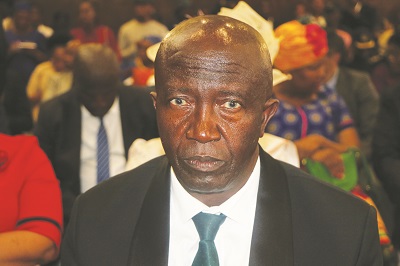By:Thoboloko Ntšonyane
MASERU – The incoming Minister of Employment and Labour Hon Tšeliso Mokhosi has pledged to ensuring that there is a stability within the labour sector.
Returning Cabinet member, Hon Mokhosi has previously served as the Minister during the past admirations and held portfolios in the Ministry of Communications, Science and Technology, Ministry of Natural Resources, Ministry of Energy and the Ministry of Defence and National Security.
He was among five Ministers who were sworn-in last week.
As a businessman, the newly appointed Minister said the labour issues are not unique to him as he resonates with this environment. This he told this publication moments after he took an oath of office ad allegiance to serve as a member of His Majesty’s Cabinet.
“I am well aware that the labour portfolio is not an easy one but I have developed a negotiations skill to sit and engage with the unions and the workers from the onset to identify what challenges they face and concerns and try to establish what plans they had going forward, which ones have challenges and what schemes can be implemented to support workers upon exiting the work place,” he assured.
Mokhosi said there is a common phenomenon where a person can work for many years and in just a month of exiting work, they start to experience financial challenges as there is no money available to cushion them. He said he will enquire on what was been done to implement a workers’ scheme that will offer them financial comfort outside employment while they are at home searching for new work opportunities.
He further promised to look into workers’ and unions proposals that will be forwarded to his office for his attention.
Asked what is one thing that he will endeavor to prioritise in his new office, he said it is the labour industry’s stability. “They [workers] need to work in a stable industry because if it is stable, we can attract the foreign investment but if there is chaos, there will be challenges.”
The country is recently facing jobs shedding especially in factories which are the highest employers along with the government.
While the Ministry works to address challenges experienced in the workplaces, there are reportedly persistent problems such as low compliance rate with the labour laws and regulations by some employers and this could be due to among others lack of awareness of labour rights among between both employees and employers.
According to the World Bank “Lesotho’s greatest challenges include a high unemployment rate. The main factors inhibiting returns to labor and jobs in Lesotho are lack of skills, high burden of diseases (especially HIV/AIDS and tuberculosis (TB), poor investment climate, and lack of key infrastructure.”
Also, the new Minister comes at a time when the United States (US) had called on for the passing of the labour laws that are in line with the stipulated international labour practices. This is one of the requirements that had been placed by the US for the government to satisfy so that it releases over $300 million, approximately M5, 6 billion funds for the much-anticipated Millenium Challenge Corporation (MCC) Compact II.
This is also one of the assignments that he will have to speedily undertake if Lesotho is to secure this multi-billion funding as the US Ambassador to Lesotho Maria Brewer had told recently told the government that it has until March 2024 to have passed those laws.
The US had previously said in a statement “MCC and the Government will now continue to work together on the compact’s administrative requirements…. Additionally, the Lesotho government must pass key legal reforms to improve women’s legal rights and protections, and to bring Lesotho in compliance with international labor standards.
“Only then will MCC and the Government of Lesotho be able to formally begin the implementation phase of the compact. This is where the five-year clock on the grant program officially begins.”


